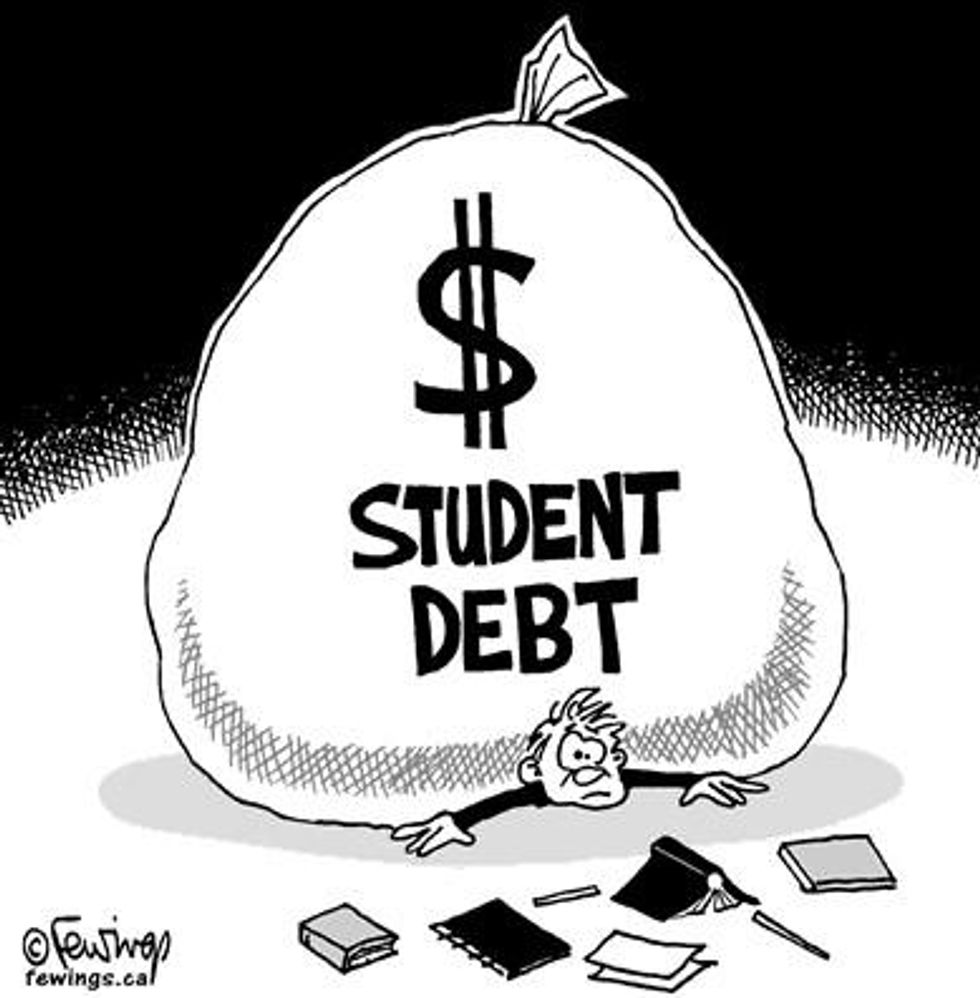The CFPB vs. Student Loan Sharks
College students today take on more debt than ever with fewer prospects of paying that money back. The Federal Reserve Bank of New York reported that 27 percent of education borrowers have past due balances.

This stems from a few causes. For starters, average college tuition has more than doubled since the 1980s in inflation-adjusted dollars. This means that college costs have risen significantly faster than the average family's income. At the same time, grant-based financial aid has remained virtually flat. As a result, most students and families find no other recourse but to use loans--a financial instrument about which, all too often, they possess incomplete, confusing, or inaccurate information.
Now those students and their families have a powerful ally: The new Consumer Financial Protection Bureau.
This week, the CFPB became "the one-stop federal agency where all private student loan borrowers can ask questions, get information, and file a complaint about the private student loan market," according to Director Richard Cordray.
Rohit Chopra, the Private Education Loan Ombudsperson, will run this new CFPB function. Its central element is a web portal that will immediately connect private education loan borrowers to their lenders and loan servicers through the CFPB website. The CFPB released a letter to 6,000 college officials across the country notifying them of the new system so they can inform students and alumni.
All this is welcome news to private education borrowers who find their rather unregulated loans may include interest rate floors but no ceilings, excessive fees, misinformation about their rights in bankruptcy, and define default in myriad ways--often at the discretion of the lender. Some lenders even use students' school of attendance to determine the interest rate on their loan.
Students can visit the portal for information purposes or to file a complaint. When students submit a complaint through the portal, they will receive an initial response within 15 days from the lender or loan servicer and should expect to see their complaints closed within 60 days. Further, if the borrower feels their complaint was not adequately or accurately resolved, they will have the opportunity to forward the unresolved complaint to the CFPB.
The CFPB will use this new portal not only to simplify a rather unregulated field of consumer finance, but to gather information and enforce regulations. Aggregate data similar to that compiled, analyzed, and released for credit cards will be released to Congress under the Dodd-Frank Act and to the public. This combination of enforcement and information will help eliminate many of the irregularities and illegal activities in this market, and may help lead to private education loan borrowers holding the same protections afforded to public education loan borrowers.
Now, private education borrowers who don't know where to turn when they feel in trouble with their loans will know exactly where to go. The CFPB as watchdog will help ensure that they learn of all their options and that they receive a fair deal in their interactions with their lenders and loan servicers. Post-secondary education ought to be a means to economic security, and the CFPB's new function has the potential to make sure the private education loan market offers financial products consistent with that dream. Let's watch and see.
An Urgent Message From Our Co-Founder
Dear Common Dreams reader, The U.S. is on a fast track to authoritarianism like nothing I've ever seen. Meanwhile, corporate news outlets are utterly capitulating to Trump, twisting their coverage to avoid drawing his ire while lining up to stuff cash in his pockets. That's why I believe that Common Dreams is doing the best and most consequential reporting that we've ever done. Our small but mighty team is a progressive reporting powerhouse, covering the news every day that the corporate media never will. Our mission has always been simple: To inform. To inspire. And to ignite change for the common good. Now here's the key piece that I want all our readers to understand: None of this would be possible without your financial support. That's not just some fundraising cliche. It's the absolute and literal truth. We don't accept corporate advertising and never will. We don't have a paywall because we don't think people should be blocked from critical news based on their ability to pay. Everything we do is funded by the donations of readers like you. Will you donate now to help power the nonprofit, independent reporting of Common Dreams? Thank you for being a vital member of our community. Together, we can keep independent journalism alive when it’s needed most. - Craig Brown, Co-founder |
College students today take on more debt than ever with fewer prospects of paying that money back. The Federal Reserve Bank of New York reported that 27 percent of education borrowers have past due balances.

This stems from a few causes. For starters, average college tuition has more than doubled since the 1980s in inflation-adjusted dollars. This means that college costs have risen significantly faster than the average family's income. At the same time, grant-based financial aid has remained virtually flat. As a result, most students and families find no other recourse but to use loans--a financial instrument about which, all too often, they possess incomplete, confusing, or inaccurate information.
Now those students and their families have a powerful ally: The new Consumer Financial Protection Bureau.
This week, the CFPB became "the one-stop federal agency where all private student loan borrowers can ask questions, get information, and file a complaint about the private student loan market," according to Director Richard Cordray.
Rohit Chopra, the Private Education Loan Ombudsperson, will run this new CFPB function. Its central element is a web portal that will immediately connect private education loan borrowers to their lenders and loan servicers through the CFPB website. The CFPB released a letter to 6,000 college officials across the country notifying them of the new system so they can inform students and alumni.
All this is welcome news to private education borrowers who find their rather unregulated loans may include interest rate floors but no ceilings, excessive fees, misinformation about their rights in bankruptcy, and define default in myriad ways--often at the discretion of the lender. Some lenders even use students' school of attendance to determine the interest rate on their loan.
Students can visit the portal for information purposes or to file a complaint. When students submit a complaint through the portal, they will receive an initial response within 15 days from the lender or loan servicer and should expect to see their complaints closed within 60 days. Further, if the borrower feels their complaint was not adequately or accurately resolved, they will have the opportunity to forward the unresolved complaint to the CFPB.
The CFPB will use this new portal not only to simplify a rather unregulated field of consumer finance, but to gather information and enforce regulations. Aggregate data similar to that compiled, analyzed, and released for credit cards will be released to Congress under the Dodd-Frank Act and to the public. This combination of enforcement and information will help eliminate many of the irregularities and illegal activities in this market, and may help lead to private education loan borrowers holding the same protections afforded to public education loan borrowers.
Now, private education borrowers who don't know where to turn when they feel in trouble with their loans will know exactly where to go. The CFPB as watchdog will help ensure that they learn of all their options and that they receive a fair deal in their interactions with their lenders and loan servicers. Post-secondary education ought to be a means to economic security, and the CFPB's new function has the potential to make sure the private education loan market offers financial products consistent with that dream. Let's watch and see.
College students today take on more debt than ever with fewer prospects of paying that money back. The Federal Reserve Bank of New York reported that 27 percent of education borrowers have past due balances.

This stems from a few causes. For starters, average college tuition has more than doubled since the 1980s in inflation-adjusted dollars. This means that college costs have risen significantly faster than the average family's income. At the same time, grant-based financial aid has remained virtually flat. As a result, most students and families find no other recourse but to use loans--a financial instrument about which, all too often, they possess incomplete, confusing, or inaccurate information.
Now those students and their families have a powerful ally: The new Consumer Financial Protection Bureau.
This week, the CFPB became "the one-stop federal agency where all private student loan borrowers can ask questions, get information, and file a complaint about the private student loan market," according to Director Richard Cordray.
Rohit Chopra, the Private Education Loan Ombudsperson, will run this new CFPB function. Its central element is a web portal that will immediately connect private education loan borrowers to their lenders and loan servicers through the CFPB website. The CFPB released a letter to 6,000 college officials across the country notifying them of the new system so they can inform students and alumni.
All this is welcome news to private education borrowers who find their rather unregulated loans may include interest rate floors but no ceilings, excessive fees, misinformation about their rights in bankruptcy, and define default in myriad ways--often at the discretion of the lender. Some lenders even use students' school of attendance to determine the interest rate on their loan.
Students can visit the portal for information purposes or to file a complaint. When students submit a complaint through the portal, they will receive an initial response within 15 days from the lender or loan servicer and should expect to see their complaints closed within 60 days. Further, if the borrower feels their complaint was not adequately or accurately resolved, they will have the opportunity to forward the unresolved complaint to the CFPB.
The CFPB will use this new portal not only to simplify a rather unregulated field of consumer finance, but to gather information and enforce regulations. Aggregate data similar to that compiled, analyzed, and released for credit cards will be released to Congress under the Dodd-Frank Act and to the public. This combination of enforcement and information will help eliminate many of the irregularities and illegal activities in this market, and may help lead to private education loan borrowers holding the same protections afforded to public education loan borrowers.
Now, private education borrowers who don't know where to turn when they feel in trouble with their loans will know exactly where to go. The CFPB as watchdog will help ensure that they learn of all their options and that they receive a fair deal in their interactions with their lenders and loan servicers. Post-secondary education ought to be a means to economic security, and the CFPB's new function has the potential to make sure the private education loan market offers financial products consistent with that dream. Let's watch and see.

